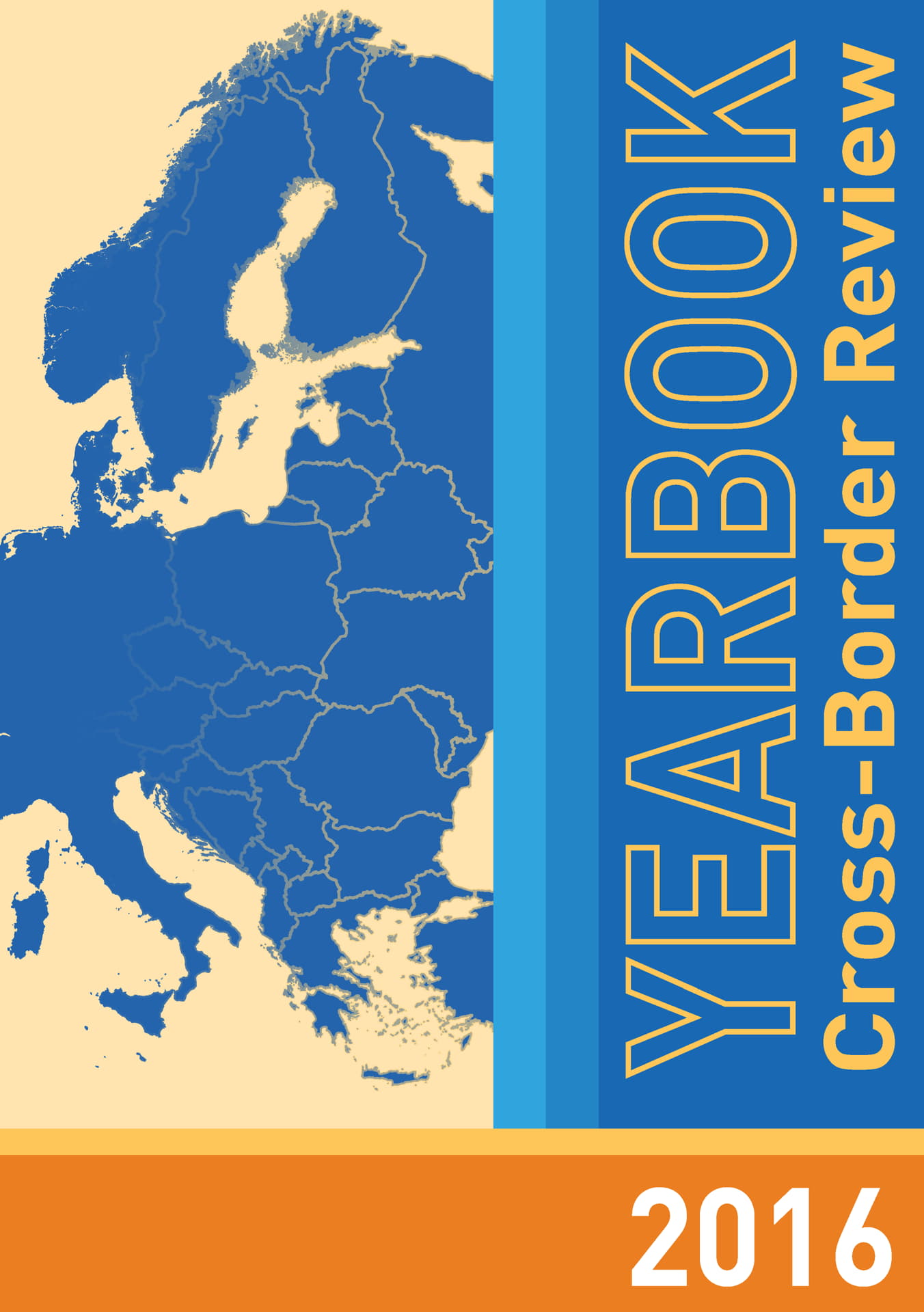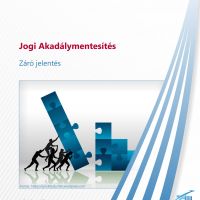
- Editor-in-chief: James W. Scott
- Publisher: CESCI European Institute
- Territory: Europe
- Year of publication: 2016
- Type: Publication
- Language: English
- Number of pages: 174
- ISSN 2064-6704
Our most significant scientific publication is our yearbook called Cross-Border Review, which has been published in English since 2014. Its editor-in-chief is James W. Scott, a world-renowned professor of Border Studies, who has successfully invited some of the most prominent European researchers in the field to be part of the editorial team.
Cross-Border Review 2016
The ‘Cross-Border Review 2016’ is the third edition of the yearbook published by CESCI European Institute of Cross-border Studies.
The basic research object of the yearbook is the phenomenon and question of borders, cross-border cooperation within the frame of European crisis and its consequences. Case study essays feature prominently in this yearbook, providing insightful and critical discussion regarding the benefits and wider significance of CBC in different regional and local contexts. Our yearbook includes topics like Europeanization, significance of CBC within EU cohesion, domestication of EU policies in the interests of the nation-building; analysis of ENP as a bordering policy and call for an alternative conceptions of neighbourhood, where the conventional practices of inclusion/exclusion need to be deconstructed; significance of tourism as a possible ‘milking’ of the border for regional development of Przemyśl and the region; analysis of European cross-border areas from the perspective of statistical data and analysis; cross-border health care as a strategy of mitigating regional/local limitations through cooperation; border flows – trade, shopping, smuggling – between Iraq and Iran, their influences and impacts on the development of Baneh. Furthermore, the yearbook contains a research report on Euborderscapes, two commentaries about everyday bordering and the Brexit, and two book reviews on some of the latest releases from the thematic field of borders.
The editor-in-chief was James W. Scott (Professor of Regional and Border Studies, University of Eastern Finland). The Review is published in English.
Contents
Feature Articles
- James W. Scott: Rebordering Central Europe: Observations on Cohesion and Cross-border Cooperation
- Jussi P. Laine: An alternative politics of borders: the EU-Russia Interphase a space of Encounter
- Martin Barthel: Milking the border – cohesive strategies in respond to the crisis of the periphery in border regions.
- Virpi Kaisto: Cross-Border Areas Facing Europe’s Crises: Problems in Measuring Territorial Development with Statistical Data and Analyses
- Teodor Gyelnik: Cross-border Health Care Cooperation in the European Union: an Effective Strategy of Mitigating Regional/Local Limitations through Cooperation
- Reza Kheyroddin, Seyed Abdolhadi Dneshpour, Mehdi Razpour: How border trade contributes to the development of Baneh and helps to fight the economic crisis of the peripheral region. A case study from the Iranian-Iraqi border
Research Report
- Henk van Houtum, Jussi Laine and James Scott: EUBORDERSCAPES – Potentials and Challenges of Evolving Border Concepts
Commentaries
- Nira Yuval-Davis, Georgie Wemyss, and Kathryn Cassidy: Changing the racialized ‘common sense’ of everyday bordering
- Cathal McCall: How ‘Brexit’ Could Destabilise the Irish Peace Process
Book Reviews
- Ieda Osamu, Susumu Nagayo eds. (2014, 2015): Transboundary Symbiosis over the Danube Slavic-Eurasian research center, Hokkaido University, 133 + 195 pp. (T. Gyelnik)
- Phil Allmendinger, Graham Haughton, Jorg Knieling, Frank Othengrafen, eds. (2015): Soft Spaces in Europe: Re-negotiating governance, boundaries and borders. Routledge, 248 p. (M. Pete)
Editor’s Note
European Crisis and its Consequences for Borders and Cooperation
A Short Introduction to the 2016 Yearbook
Border studies are still enjoying a remarkable renaissance. But perhaps partly for the “wrong” reasons. We can take, for example, the present questioning of interdependence as a political and ethical principle. As far as many of us can remember, internationalism and the emergence of a global consciousness have been self-evident realities. The Cold War, environmentalism, the “oil crisis” and, then, the dramatic collapse of East-West confrontation all made us aware of just how interconnected our national societies and communities are. To think globally, and holistically, was logical. It just made sense. For those of us who study International Relations, borders, conflict resolution and matters related to security, there seems no way of escaping the reality of mutual reliance in an interdependent world. And yet, what we now see in the world, and read in social media, among other places, is an increasing denial of interdependence, as if we could just shut out the noise from the outside world and get on with our everyday lives. What many appear to desire, in other words, is independence, not interdependence.
Why is this? Why this dramatic shift in focus? It is important to better understand the interrelated nature of local, national and global security, the move to a more insular view seems at first glance counter-intuitive. But we can find reasons for it in a wider globalization backlash which involves fear of a loss of local control and domination by transnational economic interests. In addition, as Paul Arbair forcefully argues, we are facing a crisis of complexity, in which a desire for clear and decisive action based on simple solutions has complicated political debate. [1] This helps explain the “Brexit” referendum, Donald Trump’s surprising electoral victory as well as increasing populist sentiment within the EU.
Turning away from interdependence may have major consequences for security, both locally and more globally. For example, without global action, the repercussions of a deteriorating environmental situation many threaten the stability of many states: drought, flooding and rising sea levels could translate into more forced migration and regional conflict. While emerging countries are certainly more vulnerable, Europe and North America will not be shielded, even by higher walls or border fences. Furthermore, the industrialised countries are facing unprecedented economic challenges. Many of the promises of job creation, e.g. through protecting local markets, simply cannot be kept, and popular frustration over decreasing material security could play into the hands of authoritarian leaders. The consequences of weakened democracy could in fact be dire. In a rather alarming tone George Monbiot of the Guardian writes [2]: “Eventually the anger that cannot be assuaged through policy will be turned outwards, towards other nations (…) I now believe that we will see war between the major powers within my lifetime.”
Alternative scenarios to increasing conflict require an honest political debate about the global impacts of local action and the commitments and responsibilities that we share. Independence, if understood as greater citizen participation, democracy, inclusion and capacity-building could in fact be a vital resource. However, denial of mutual reliance and reluctance to engage in common action will have higher social, economic and environmental costs that we perhaps presently imagine.
Closer to home, the EU’s present crisis – comprised of a number of specific dilemmas – is at once a crisis of identity and of Europe’s borders. A major exceptionalist narrative of the EU has been the achievement of open borders within the EU as well the institutionalisation of permeable but secure borders with neighbouring states. These achievements are under threat as EU-member states clamour for a greater degree of local control and the EU is accused of losing control over its external boundaries.
Given this negative backdrop, the 2016 yearbook can only confirm the importance of cross-border and regional cooperation. For this reason, case study essays feature prominently in this yearbook, providing insightful and critical discussion regarding the benefits and wider significance of CBC in different regional and local contexts.
Consequences for Border Policies?
One common understanding that links the rather different case study contexts presented here is that of border-making, or bordering, as an everyday process of interaction between different groups and social needs we argue that it would be possible to foster innovative policies capable of promoting a more comprehensive understanding of the opportunities and challenges that open borders signify. The ways in which we theorise borders have a very real implication for the borders we practice. Today’s methodological advances point out the need to overcome oppositions between narratives and theories, between theories and practices, by highlighting, instead, how it is in their interplay that a new “emotional” knowledge could be produced.
Border policy should pay much attention to the specific contextual and historical conditions of contemporary borderlands, thereby advancing a perspective which gives voice to a multiplicity of individual and group stances on contemporary borders. This entails identities, perceptions, beliefs, and emotions. We need to inquire about people’s practices and experiences of dealing with the border interactions, both political and territorial, as well as symbolic and cultural. At the same time, this grounded diversity of perspectives and practices should be related back to the broader economic, political and geopolitical shifts defining contemporary flowing borders, in order to better understand the dialogue between the various scales of action through which borderscapes are made and experienced.
We should involve different and sometimes new actors who can constitute nodes of cooperation networks across borders, to exploit opportunities for new forms of interaction and thus improve dialogue. A bottom-up perspective (“policy-from-below”) should be adopted in order to avoid reproducing a Eurocentric vision and simply projecting and replying European values. We also need to develop tools for improving communication and cooperation among different actors, to strengthen existing relations and to add new actors previously not included.
A relational perspective would take into account complementary perspectives considering the interaction between political visions and everyday socio-cultural practices as well as social representations and artistic imaginaries. This would help to advance border policy based on complementary perspectives capable of grasping the dialogic nature of bordering processes and imaginaries, as well as the tension between institutional formal modes of political agency and social non-formal modes of agency that co-constitute contemporary borderscapes.
Finally, we need to shape and foster innovative border policies that engage and critically address the multilevel complexity of borders – from the geopolitical level to the level of social practices and cultural productions. This would represent a significant shift in border policy perspective that might offer a real opportunity to fully capture the many implications that the constantly changing historical, political, and social contemporary world’s contexts imply at different scales.
James W. Scott
1 Available at https://paularbair.wordpress.com/2016/07/05/brexit-the-populist-surge-and-the-crisis-of-complexity/

